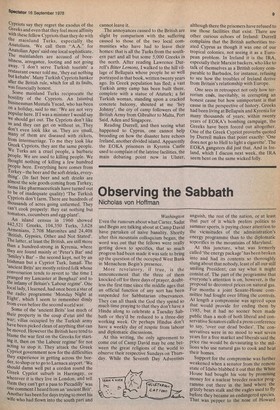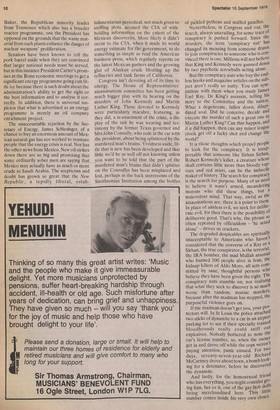Observing the Sabbath
Nicholas von Hoffman
Washington Even the rumours about what Carter, Sadat and Begin are talking about at Camp David have partaken of naive banality. Shortly after this mountain colloquium began, the word was out that the fellows were really getting down to specifics, that so much progress had been made it was safe to bring up the question of the occupied West Bank in Menachem Begin's presence.
More revelatory, if true, is the announcement that the three of them knocked off for three days of prayer, doubtless the first time since the middle ages that an official function of any sort has been suspended for Sabbatarian observances. They can all thank the God they spend so much time praying to that they don't have a Hindu along to celebrate a Tuesday Sabbath or they'd be reduced to a three-day working week. Or perhaps Hindus don't have a weekly day of respite from labour and diplomatic discussions.
At this writing, the only agreement to come out of Camp David may be one between the great religions of the world to observe their respective Sundays on Thursday. While the Seventh Day Adventists anguish, the rest of the nation, or at least that part of it which prefers politics to summer sports, is paying closer attention to the vicissitudes of the administration's energy programme than to the diplomatic soporifics in the mountains of Maryland.
At this juncture, what was formerly called 'the energy package' has been broken into and had its contents so thoroughly slung about that nobody, least of all our still smiling President, can say what it might consist of. The part of the programme that everyone's attention is on, however, is the proposal to decontrol prices on natural gas. For months a joint Senate-House committee had fought over lifting the controls. At length a compromise was agreed upon that would provide for ending them by 1985, but it had no sooner been made public than a mob of both liberal and conservative Senators called a press conference to say, 'over our dead bodies'. The conservatives were in no mood to wait seven years for a free market and liberals said the price rise would be devastating to the millions who use natural gas to cook and heat their homes.
Support for the compromise was further weakened when a senator from the remote state of Idaho blabbed it out that the White House had bought his vote by promising money for a nuclear breeder reactor programme out there in the land where the grizzly bears stalk and the eagles used to fly before they became an endangered species. That was pepper to the nose of Howard Baker, the Republican minority leader from Tennessee which also has a breeder reactor programme, one the President has opposed on the grounds that the waste material from such plants enhance the danger of nuclear weapons' proliferation.
Senators have been known to roll the pork barrel aside when they are convinced that larger national needs must be served, but in this instance President Carter's promises at the Bonn economic meetings to get a significant energy programme going cuts little ice because there is such doubt about the administration's ability to get the right or the best information and to analyse it correctly. In addition, there is universal suspicion that what is advertised as an energy programme is merely an oil company enrichment project.
The unaccountable rejection by the Secretary of Energy, James Schlesinger, of a chance to buy an enormous amount of Mexican natural gas has not worked to reassure people that the energy crisis is real. Nor has the other news from Mexico. New oil strikes down there are so big and promising that some ordinarily sober men are saying that Mexico may actually have as much or more crude as Saudi Arabia. The scepticism and doubt has grown so great that the New Republic, a tepidly liberal, estab lishmentarian periodical, not much given to sniffing plots, accused the CIA of withholding information on the extent of the Mexican discoveries. More likely it didn't occur to the CIA, when it made its world energy estimate for the government, to do something as simple as read the American business press, which regularly reports on the latest Mexican gushers and the growing glut of Alaskan crude bloating up the refineries and tank farms of California.
Congress isn't devoting all of its time to energy. The House of Representatives' assassinations committee has been getting much bigger play with its hearing on the murders of John Kennedy and Martin Luther King. Those devoted to Kennedy were particularly macabre, featuring, as they did, a re-enactment of the crime, a display of the suit he was wearing and testimony by the former Texas governor and Mrs John Connally, who rode in the car with the president, about being splattered by the murdered man's brains. Vividness aside, little that is new has been developed and that little we'd be as well off not knowing unless you want to be told that the part of the murdered man's brains that didn't splatter on the Connallys has been misplaced and lost, perhaps in the back storerooms of the Smithsonian Institution among the bottles of pickled pythons and stuffed gazelles. Nevertheless, in Congress and out, the search, always unavailing, for some trace of conspiracy is pushed forward. Since the murders, the term. 'conspiracy nut' has changed its meaning from someone drawn to join conspiracies to someone who is convinced there is one. Millions will not believe that King and Kennedy were gunned clown by two psychotic screwballs acting alone. But the conspiracy nuts who buy the endless books and magazine articles on the subject aren't really so nutty. You can syrnpathise with them when you study James Earl Ray, Dr King's assassin, telling his story to the Committee and the nation. What a degenerate, fallen down, dilapidated soul. Did he conceive, decide and execute the murder of such a great one as Martin Luther King? Can that happen, and if it did happen, then can any minor league crook get off a lucky shot and change the world?
It is those thoughts which propel peoPle to look for the conspiracy. It is insupportable that someone like Sirhan Sirhan, Robert Kennedy's killer, a creature whose skull contains little more than bloody vapours and red mists, can be the imbecile maker of history. The search for conspiracy is the search for purpose. Many of us need to believe it wasn't armed, meandering morons who did these things, but a malevolent mind. That way, awful as the assassinations are, there is a point to themIn place of aimless evil, we seek for deliberate evil, for then there is the possibility of deliberate good. That's why, the phrase so often repeated by officialdom — 'he acted alone' — drives us crackers. The degraded despicables are spiritually unacceptable to Americans who haven t considered that the converse of a Ray or a Sirhan, the true conspirator, is the terrorist, the IRA bomber, the mad Mullah arsonist who burned 300 people alive in Iran, the kidnap killers of Aldo Moro, all acts committed by sane, thoughtful persons who believe they have been given the right. The conspiracy nuts stumble on, not realising that what they seek to discover is so much worse than random, maniac murders, because after the madman has stopped, the purposeful violence goes on.
If the madman doesn't get you, your protectors will. In St Louis the police attached two sticks of dynamite to a car in an airport parking lot to see if their specially trained bloodhounds really could sniff out explosives. Nobody bothered to note the car's license number, so, when the owner got in and drove off while the cops weren t paying attention, panic ensued. For two days, seventy-seven-year-old Richard McCartney drove about town, a bomb looking for a detonator, before he discovered the dynamite. And lastly, for the homosexual friend who has everything, you might conSider giv ing him, her or it, one of the gay Bob dolls being merchandised here. This little number comes inside his very own closet.



































 Previous page
Previous page